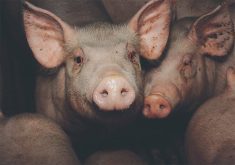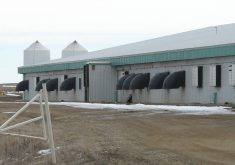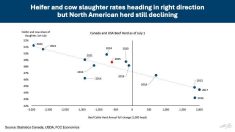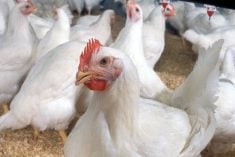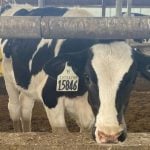Reuters – Some big U.S. pork producers that have spent money to comply with a California law requiring more living space for certain farm animals are lukewarm about legislation proposed in the U.S. Congress that would overturn the state law.
Why it matters: Canadian pork groups say Prop 12 will introduce non-tariff trade barriers and hurt the sector north of the international border.
The National Pork Producers Council supports the Ending Agricultural Trade Suppression (EATS) Act, a bill introduced by U.S. Senator Roger Marshall and Representative Ashley Hinson that would curb the ability of states to regulate agricultural products sold within their borders.
Read Also

VIDEO: Manitoba’s Past Lane – Jan. 31
Manitoba, 1946 — Post-war rations for both people and cows: The latest look back at over a century of the Manitoba Co-operator
The lawmakers have said their aim, in part, is to overturn California’s Proposition 12 (Prop 12), which bars sales of pork, veal, and eggs from animals whose housing conditions fail to meet the state’s standards.
But Clemens Food Group, the No. 5 pork processor in the country, said it does not support the EATS Act. Other big producers like Hormel, Smithfield and Tyson have said publicly that they intend to comply with the California law when it takes effect Jan. 1, 2024.
The NPPC has fought Prop 12 since it passed by ballot initiative in 2018. In May, the farm group lost a case against the law before the U.S. Supreme Court.
Animal rights groups that champion Prop 12 cite current housing conditions in some sow and poultry barns, such as enclosures too small for a sow to turn around.
In an emailed statement, NPPC CEO Bryan Humphreys said the law would not improve animal welfare, would raise costs for hog producers and could lead to more “ideological” state restrictions.
However, some pork and egg companies have already invested in bringing a segment of their production into compliance with Prop 12.
Clemens, a member of the NPPC, has invested capital and time to upgrade facilities and train farmers to comply with the law, said chief operating officer Chris Carey.
“We ultimately don’t believe the EATS Act is aligned with progress in animal welfare,” Carey said.
Roughly a third of the egg industry is already in compliance, said Brian Moscogiuri, global trade strategist at egg supplier Eggs Unlimited.
Hormel Foods, Smithfield Foods and Tyson Foods did not respond to questions about the EATS Act.
Spillover
Other concerns involve potential spillover of the bill. Galina Hale, an economics professor at the University of California-Santa Cruz, suggested food companies could lose the ability to differentiate their product in the marketplace and court a higher price, should the EATS Act come into play.
The bill could also void more than 1,000 state and local public health and safety regulations because it is broadly written, according to a report by Harvard Law School’s Animal Law & Policy Program.
“Every aspect of this is going to be challenged by one side or another,” said Chris Green, the program’s executive director.
Cross-border impacts
The Canadian pork sector has been vocally critical of Prop 12.
Last year, the U.S. was the end destination for 6.7 million Canadian-born hogs. Groups like the Manitoba Pork Council, whose sector ships millions of piglets south annually, are concerned that a mismatch between Prop 12 standards and Canadian housing realities would reduce that trade.
Canada’s own move to group sow housing is underway. The Manitoba Pork Council estimates that 60 per cent of the province’s sows are already housed in those conditions, but it is unclear if those facilities meet California’s standard.
The pork sector is also concerned about the legal precedent of the state-level Prop 12.
“We need to be able to have a North American market that’s integrated, allows for the free flow of product and isn’t different in every different state,” council general manager Cam Dahl said in an early June Co-operator article.
– With files from Glacier Farm-Media staff



